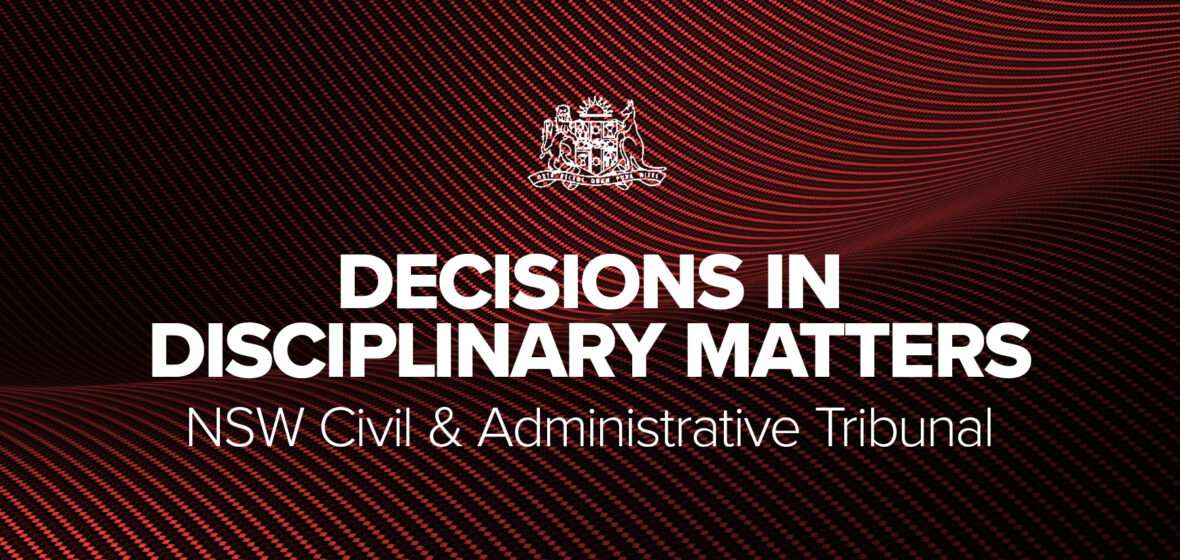Recent NCAT decisions involving solicitors
Ndou v Council of the Law Society of New South Wales [2023] NSWCATOD 111
Decision published: 26 July 2023
On 28 July 2022, the Professional Conduct Committee of the Council of the Law Society of New South Wales (PCC):
- Found that Mr Lovemore Ndou had engaged in unsatisfactory professional conduct in relation to the following conduct:
- Mr Ndou breached a Local Court order made on 21 November 2019 by using information and/or document(s) produced in those proceedings in his client’s affidavit dated 12 December 2019 and filed in the Family Court (Local Court Orders Conduct); and
- Mr Ndou breached the Harman Principle, as outlined in Harman v Secretary of State for the Home Department [1983] 1 AC 280, by using information and/or document(s) produced in the Local Court proceedings for a collateral purpose (Harman Principle Conduct).
- Issued Mr Ndou with a reprimand.
- Made an order requiring Mr Ndou to undertake and complete legal ethics training within 6 months from notification of the PCC’s resolutions.
On 21 October 2022, Mr Ndou commenced proceedings in the New South Wales Civil and Administrative Tribunal (Tribunal) to seek administrative review of the PCC’s resolutions.
Mr Ndou sought a variation to the PCC’s resolution to issue him with a reprimand and argued that he should, instead, be issued with a caution or no disciplinary order. As at the date that Mr Ndou commenced the proceedings, he had already completed the legal ethics training the subject of the PCC’s resolution and, on that basis, did not seek any decision in relation to that resolution.
The Tribunal made orders:
- affirming the PCC’s finding that Mr Ndou had engaged in unsatisfactory professional conduct;
- affirming the PCC’s resolution reprimanding Mr Ndou; and
- varying the PCC’s disciplinary orders requiring Mr Ndou to complete a legal ethics course, by ordering that Mr Ndou is required to pay a fine in the sum of $2,000 within 60 days of the Tribunal’s decision.
The Council of the Law Society of New South Wales (Council) did not press the legal ethics education order because Mr Ndou had completed the legal ethics course as at the date of the hearing. The Tribunal’s decision provides (at [108]) that had Mr Ndou not completed the ethics course, it would have found it necessary for him to do so and made orders to that effect.
With respect to the Local Court Orders Conduct, the Tribunal held:
“[68] …The applicant admits that his conduct amounted to a contravention of the order of the Local Court.
[69] We accept that the breach was unintentional in that the applicant overlooked the order. Nonetheless, we consider that the conduct falls well short of the standard of competence and diligence that a member of the public is entitled to expect of a reasonably competent lawyer and amounts (at the very least) to unsatisfactory professional conduct.”
With respect to the Harman Principle Conduct, the Tribunal held:
“[75] … The need to ensure that the subpoenaed documents not be used for an ulterior or collateral purpose should have been apparent to the applicant. As an experienced advocate in criminal and family law proceedings, aware of his duties to the Court, it is surprising that [the Applicant] would claim ignorance of the obligation. In any event, this is insufficient to avoid liability: Hearne v Street at [112].
…
[81] We are satisfied that the applicant’s conduct, at the very least, amounted to unsatisfactory professional conduct, having fallen short of the standard of competence and diligence that is expected of a reasonably competent lawyer. This is particularly so, given that he is an experienced advocate.”




